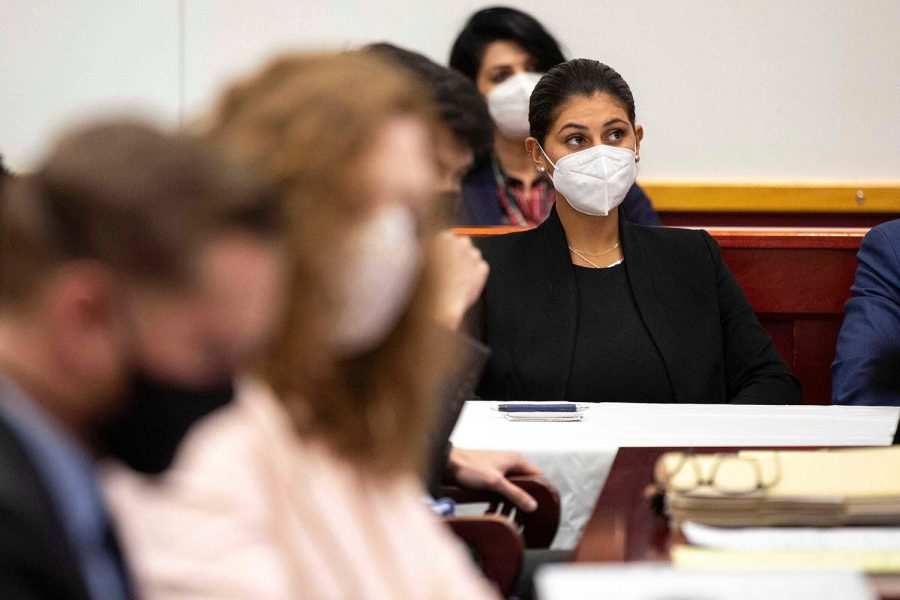UI professors say Sahouri trial emphasizes need for freedom of the press
Andrea Sahouri of The Des Moines Register was acquitted on both charges she faced while reporting on scene at a Black Lives Matter rally this summer.
Kelsey Kremer via Imagn Content
Des Moines Register reporter Andrea Sahouri listens to opening statements in her trial on Monday at the Drake University Legal Clinic in Iowa.
March 17, 2021
The trial of Des Moines Register reporter Andrea Sahouri brought national attention to Iowa, and media experts, including Sahouri herself, have continued to emphasize in classrooms, to young journalists, and to the public that the unique charges Sahouri faced posed a threat to press rights.
Sahouri was acquitted of failure to disperse and interference with official acts by a jury on March 10. She was arrested while reporting at a Black Lives Matter protest in Des Moines in May 2020.
Sahouri said in an interview with The Daily Iowan that the media has exponentially been targeted in the last few years, and freedom of the press continues to face a major threat.
“It is so crucial, I can’t emphasize that enough, but it is under a huge threat,” Sahouri said. “I think that says how important it is for us to continue documenting the history and informing our community.”
During the trial, prosecutors argued Sahouri’s arrest was justified as she did not have proper press credentials, despite telling the police that she is a journalist numerous times.
Sahouri holds a master’s degree in journalism, and she said the most frustrating part of the trial was being told how to do her job and the victim-blaming she faced.
“They were fully aware that I was a journalist and instead of looking at their actions and thinking about what they could have done differently in that situation, they’re victim-blaming, and I think that is extremely insulting and inappropriate,” Sahouri said. “I was just doing my job.”
University of Iowa assistant professor in the School of Journalism and Mass Communications Kylah Hedding said she is a strong supporter of the First Amendment and freedom of the press.
“I think that any time that any sort of government entity starts to get into the business of silencing and controlling what people can say, we are headed down a very dangerous and scary path,” Hedding said.
RELATED: Black Lives Matter — two weeks of protests in Iowa City
In an email to the DI, Hedding said she will talk about the Sahouri case from a PR angle in a class that she’s teaching.
“I’m teaching PR classes this semester, so I’ll also discuss some of the PR issues the Des Moines PD and Polk County prosecutor have faced,” Hedding said.
Kenneth Starck, a professor emeritus at the UI, served as the director of the School of Journalism and Mass Communication for 17 years between 1975 and 1996.
Starck said Sahouri showed the importance of professionalism under all circumstances.
“The reporter did a good job of illustrating how a journalist should operate, under those circumstances, she obviously remained very professional,” Starck said. “According to the testimony she said quite early on in the encounter that she was a journalist with the Register.”
Starck said journalists and police officers should mend their relationship to understand each other’s roles.
“I think there is probably a communication gap between journalists and what journalism stands for and policing,” Starck said. “I don’t know if there is a program anywhere that brings police and journalists together to try and slip into each other’s shoes to find out what each party really experiences”
Director of the Iowa Freedom of Information Council Randy Evans said the charges against Sahouri were historically unusual.
“In my forty years at the Des Moines Register, I can only remember one other criminal trial involving a Register journalist,” Evans said. “In the long view of history, this is pretty unusual.”
According to the U.S. Press Freedom Tracker, the last trial of a journalist in the United States occurred in 2018, when Jenni Monet, a freelance journalist writing for The Center for Investigative Reporting, was arrested during her coverage of protests over the Dakota Access Pipeline in North Dakota.
Monet was arrested in February 2017 despite showing press credentials to law enforcement. At her trial in June 2018, she was found not guilty of criminal trespass. She said in a Facebook post that being cleared of all charges was a “great day for journalism”.
Evans said the Des Moines Police and the Polk County Attorney’s Office seem to not be cognizant of the role of the media, especially during times of civil unrest.
“The citizens need to have journalists out there acting as their eyes and ears, telling the stories and what protesters are experiencing, what business owners are experiencing, and what law enforcement is going through,” Evans said.
Evans said the role of the press is important in both the best of times and in moments of civil unrest.
“While the prosecution tried to minimize Andrea Sahouri’s role as a journalist in the trial this week, I think that is very much of concern to the people of Iowa and across the United States,” Evans said. “I think that we would be in a troubling situation if journalists were being arrested more frequently.”






